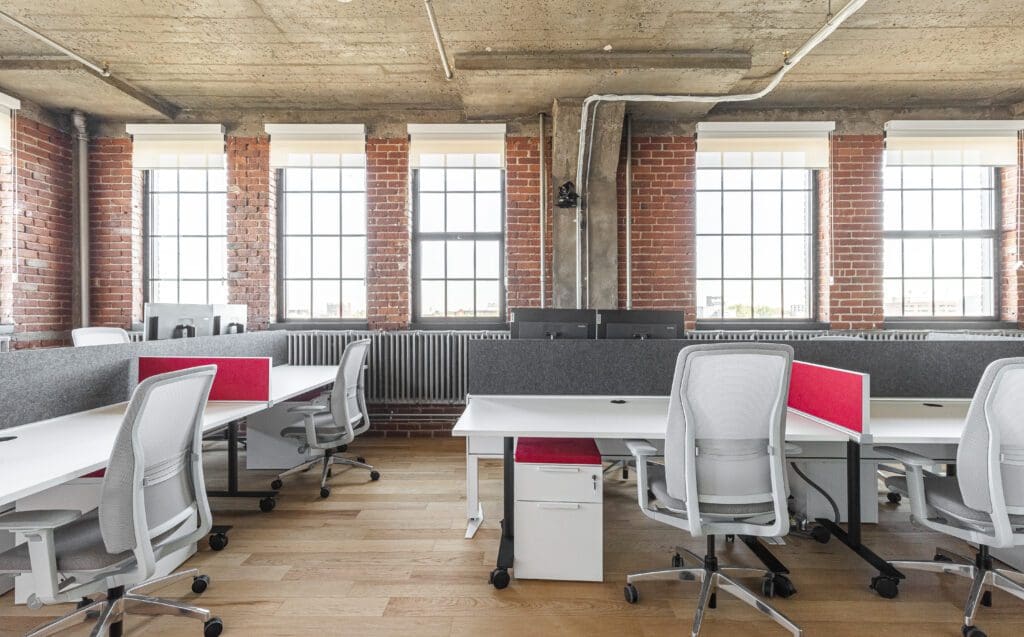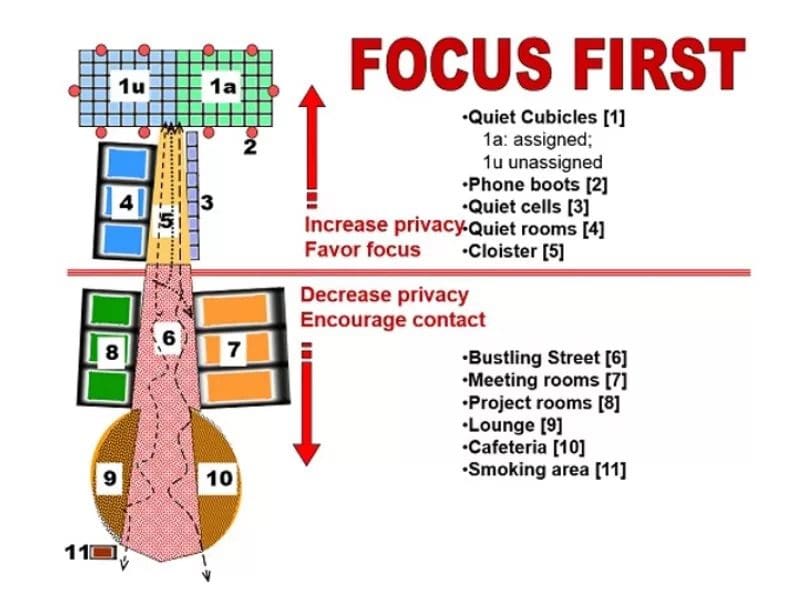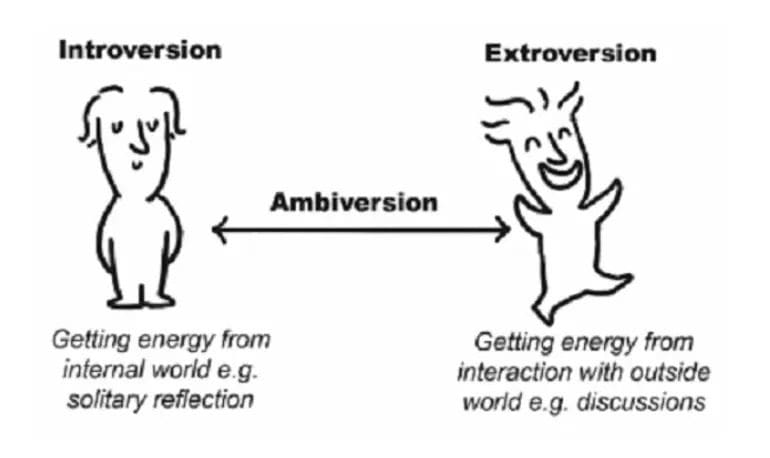Office space
April 23, 2020
Open Offices – Part 2: The Solution

In one of our latest blog posts, we gave you a summary of the first part of the book “The Open Office is Naked: The Fifth BrainChain”, by professor and doctor Theo Compernolle which included an enlightened look at the functioning of the brain as well as the problem that open offices represent for intellectual work.
In this second part, we will discuss the solution that Mr. Theo Compernolle proposes to create productive office spaces.

But before explaining in detail the envisaged solution, it is worth recalling the approach used by Doctor Theo Compernolle with regard to improving intellectual production among workers.
According to him, there are 3 different levels on which to act to increase intellectual productivity:
The “Me” Level
Each employee should be asking the following question: “What can I do to improve the quality and quantity of my intellectual work?”
It might be challenging to do so in a hostile work environment, that is to say in open office spaces to manage to concentrate and think in order to be as productive as possible.
Several workers, in an effort to improve intellectual productivity and reduce exhaustion, will wear an anti-noise device that will have a double impact: reduce noise pollution and give a clear message to those around them to “do not disturb”.
Although seen as anti-social for some people, wearing a headset helps to focus by masking background noise. However, it is very difficult to obtain a good masking of external noise because its effect depends on the quality of the headphones and each person’s hearing levels, as well as the intensity of what is being masked. In an open-plan office, the noise levels change all the time, being more or less intense.
In addition, it’s important to take into account differences in individual perception. What is good masking noise for one person is unbearable noise for someone else. Introverts perform better than extroverts when there is no background noise or music. Some extroverts work better with distracting noise than without, especially when the task is boring.
In any case, although widely used, masking noise is certainly not the miracle cure for solving the noise problems of a poorly designed open office.
If the opportunity arises, more and more workers will avoid the office by working from home to be more productive. But in the case of remote work, we must remain vigilant and set limits. Indeed, when you work at home, family, friends, children, pets and acquaintances often do not take this real work into account and think that you can be disturbed at any time. You must explain the situation to them, establish rules and respect them.
Therefore, when you work from home, you must organize yourself so that you can concentrate. Do not underestimate the impact of your environment on the quality of your work and on your concentration.
Some tips and tricks to be productive while working from home:
- make yourself comfortable in a room with the least possible disturbance,
- stick to a specific schedule, set the time for emails, phone calls, breaks and other tasks,
- reserve an undisturbed concentration time to work on important tasks without any interruption,
- post all social media and web browsing interactions until your day’s work is done,
- dress for work, because the quality of your work will be better than if you stay in pajamas or jogging.
The “We” Level
These are the things that all colleagues can do among themselves to improve their office or at least, to help open the discussion on the improvements needed in their office.
For managers, there are two other “We”: the things they can do with their team for the part of the business for which they are responsible and the initiatives they can take within the entrepreneurial team.
The “They” Level
It is about what people higher up in the hierarchy can and should do to improve thinking work across their organization or in their department. Managers must prioritize intellectual productivity.
The solution to the open office problem, which undermine the productivity of intellectual work requiring concentration and reflection, is found in at level “They”.

Create flexible and friendly offices
Building flexible offices that maximize intellectual productivity by eliminating distractions and improving collaboration is the solution!
Basically, a very flexible mix of workspaces should be offered, flexible in the sense that the offices will adapt to the needs of workers and their work instead of the reverse which is most common.
Theoretically, there are two steps to follow when building or renovating an office. The first way is to see the office and the employees as a cost and that requires that the employees adapt to a workspace designed for short term profitability. This is actually what too many companies do with open-plan offices.
The second axis is to consider the office as an investment in people, to give priority to improving the intellectual productivity of employees and to adapt the workplace to the very basic needs of intellectual workers and their “caveman” interior.
The solution is to ensure concentration and confidentiality
Employees who can focus are 57% more efficient in collaboration, 88% more in learning, 42% in socialization, 31% in innovation and they have 31% higher job satisfaction than others.
Priority should be given to concentration, as it is more difficult to achieve than contact. Thus, to improve intellectual productivity, one should not try to carry out in the same space high quality and interaction, since they require different levels of confidentiality.
Indeed, you should not try to combine focus and contact in one and the same space, but combine them in different spaces or subspaces.
Intellectual workers must be guaranteed the optimal privacy their brains need to think well when doing high-level brain work.
Individual workspaces must therefore offer an optimal level of privacy, eliminating all unwanted intrusions. When this is guaranteed then one should start looking for ways to increase collaboration and communication, without sacrificing the employees’ ability to focus. Only when concentration is guaranteed can you get the desktop setup to encourage people to interact as soon as they leave their thought bubble. A lack of privacy often diminishes meaningful communication and collaboration.
The office must be flexible to adapt to different needs and different jobs
What a truly flexible office requires above all is a lot of flexibility on the part of management and executives, who must adapt to the needs of workers and their work. As the Google experience shows, getting a flexible office is hard work and continuous work in progress, and must be achieved in very close communication with workers and in particular by really listening to their comments.
Since the tasks of modern workers are as varied as their needs, offices should above all be flexible so that people can have the degree of privacy they need to be optimally productive at a given time for a particular task. It depends not only on the task and the stage of a project, but also on the types of personality. In fact, introverts and extroverts have very different needs. The most introverted people, who are more aware of the surrounding noise and its effects, should be able to work in a quiet space, without being considered fragile beings.
In addition, since a high degree of personalization protects employees from exhaustion caused by poor privacy, employees should be allowed, or even actively encouraged, to personalize their workspace.
Remove the noise
The number one intrusion that kills intellectual productivity is noise.
Eliminating noise should be the top priority in the design of office space, since noise has an extremely negative impact on intellectual poductivity, satisfaction, motivation and increases the emotional exhaustion of workers.
The worst noises are those of intelligible conversations and the most horrible are those of telephone conversations. It is therefore necessary to combat noise in general on all possible fronts: the height and quality of sound absorption of ceilings and walls as well as the degree of reverberation of noise. Noise reduction is never cheap, especially for renovating a poorly constructed office, as many interacting variables must be taken into account, but it is always worth the investment.
There should be separate rooms where people can have phone calls or conversations without disturbing others. Encourage people to be polite to each other, as the volume and frequency with which they speak will make a big difference. Everyone tends to speak louder when there is background noise.

A framework for thinking about creating an excellent flexible office
The figure above represents a model, a representation of the different solutions that a flexible office must provide to respond to different aspects of brain work and to different types of people. This framework for reflection was created by Professor Theo Compernolle to summarize the results of his research.
In conclusion: put your workers and the needs of their brains first!
Too often, offices are built without remembering that over the past few decades, office work has fundamentally changed, moving from low-level routine work to higher-level knowledge work that requires concentration, attention, analysis, synthesis, creativity and reflection.
The open offices that were good enough for this routine work are clearly a disaster for intellectual work. Indeed, they often worsen communication and collaboration rather than anything else, because they are built by frameworks that prioritize cost reduction, without guaranteeing confidentiality and thus, they do not meet the basic needs of the brain and intellectual workers.
The solution is therefore a flexible office, but not in the usual sense that workers have to be very flexible in adapting to rigid and counterproductive office buildings, which in fact leads to a drop in intellectual productivity, as well as to frustration and exhaustion. But a flexible office that adapts to the needs of workers. When planning such an office, the first priority should be confidentiality and the reduction of harmful noise in order to improve collaboration and communication. But “flexible” offices will not make a rigid company more flexible, as the corporate culture is largely determined by the culture of leadership.
Of course, office workers have a big responsibility to do what they can to improve their own intellectual productivity.
Source: “The Open Office is Naked: The Fifth BrainChain” by Theo Compernolle. MD., PhD at www.brainchains.info
Looking For Advice Regarding Your Project?
Contact usShare
